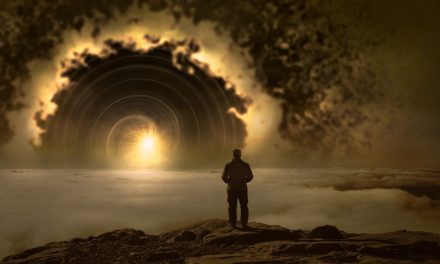Perhaps the saddest thing about our religious traditions is their failure to glorify the human body as the temple where God and Goddess meet to dance round the fruit-bearing tree of the spine, uniting in the bridal chamber of the heart.
Instead, Western religions have covered the body with a veil of shame, while the so-called “non-dualists” of the Eastern traditions insist that “I am not this body.”
Oh yes I Am.

I Am the Body, I Am the Radiance around the body, and I Am the energy field of this beating bloody heart that extends beyond the stars, enfolding the farthest galaxies.

I Am the Body, located right here, and I Am the non-localized ocean of light into which each quantum particle of the body dissolves this instant. My body is a holographic matrix of resonant emptiness containing all the information in the cosmos, and the death of my body is but a return of these ripples in space-time to their stillness. Nothing is lost, nothing is added. When we cease clinging to what dissolves, the body no more limits the Spirit than a mirage limits the blue and boundless sky. Each electron in my flesh contains a charge of electricity, a charge of Shakti, a charge of bio-stellar Glory, greater than ten thousand suns.

This is no New Age talk. It is the teaching of ancient Yogis and the teaching of the primitive Church. Jesus declares that when your inner eye is one, “your whole body will be filled with light.” (Mat 6:22) “Glorify God in your body!” sings the Epistle to the Corinthians. “Do you not know that your body is the temple of the Holy Spirit?” (1 Cor. 6) In the 2nd Century, one of the first and greatest Christian theologians, Saint Athanasius, wrote: “God became human so that humans could become God.”

The actual message of Jesus has nothing to do with shaming the body, and everything to do with celebrating the Incarnation. Jesus manifested a body to demonstrate that the Spirit expresses her divine breath through human form. On this planet, the Word is made flesh.

But after the Council of Nicaea in 325 C.E., theologians discovered they could control their congregations through shame and guilt. The fundamentalist movements that resulted from this distortion of the original message all manifest violence, based on repression of the body. They mutilate the myth of Adam and Eve to suggest that the “sin” was Eve’s surrender to sexual temptation. However, there is nothing in the original story to suggest this at all. The so-called Fall was not sexuality or embodiment. It was our descent into dualistic mind, a mind conflicted by opposites, a mind that seeks its nourishment, not from the Tree of Life, but from the Tree of the Knowledge of Good and Evil. The only “sin” is apparent separateness, magnified by shame. Sin is ignorance of the unity of being.

The rupture of our wholeness results in a chain reaction of illusions, all in the mind, generating actions that create a culture of conflict. We act from our perception that humanity is alienated from God, man from woman, soul from body, black from white, and heaven from earth. When these illusions dissolve, it becomes clear that there is only one “sin”– to tear asunder our immediate spontaneous intuition of unity. Our original innocence in the Garden was the unity of spirit, breath, and body. Which is not only the wholeness of Christ incarnate, but the actual definition of “yoga.”

Ironically, in the present age, those who recall us to our original innocence are not so often the ministers, imams and rabbis of religion, but the poets, musicians, and artists of the world. In the words of the sublime under-appreciated novelist, E. M. Forster, “The Garden of Eden, which you place in the past, is really yet to come. We shall enter it when we no longer despise our bodies.”








Amen to this!